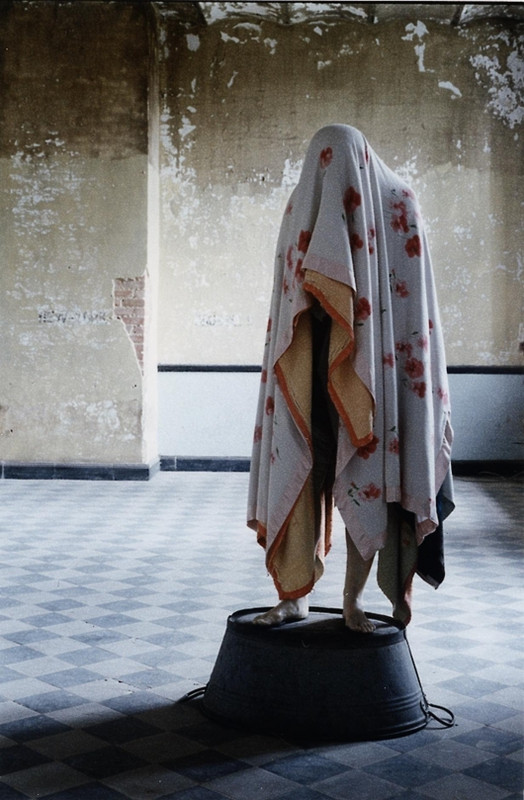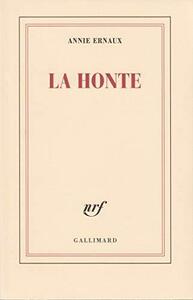Take a photo of a barcode or cover
reflective
fast-paced
emotional
reflective
tense
challenging
emotional
challenging
reflective
tense
medium-paced
reflective
sad
emotional
informative
reflective
fast-paced
Nobel prize in literature 2022 "for the courage and clinical acuity with which she uncovers the roots, estrangements and collective restraints of personal memory"
I had seen the unseeable
Shame is the fourth book I have read by Annie Ernaux this year (the other books were [b:The Possession|3597353|The Possession|Annie Ernaux|https://i.gr-assets.com/images/S/compressed.photo.goodreads.com/books/1320557777l/3597353._SY75_.jpg|3640038], [b:Simple Passion|399257|Simple Passion|Annie Ernaux|https://i.gr-assets.com/images/S/compressed.photo.goodreads.com/books/1320521854l/399257._SY75_.jpg|388702] and [b:The Years|34355387|The Years|Annie Ernaux|https://i.gr-assets.com/images/S/compressed.photo.goodreads.com/books/1498867440l/34355387._SX50_.jpg|3110233]) and it struck me mostly as another chapter in the socio-autobiography she is writing on her life. This piece focusses on her years as a young adolescent, the incipit the memory of an incident between her parents which the 12 years old Annie involuntarily witnessed. The impossibility to talk about the incident at the time prompts her to investigate that specific year 1952, to get closer to herself, to the girl she used to be, ruminating on and observing herself in her environment, through her parents, the private Catholic school she attended, the better and less situated girls on her school, contemplating her state of consciousness at twelve and now, through the two ideals held forth by her parents that were embodied in sending her to such a school: religion and education.
The incident functions as the madeleine biscuit in Proust, however not evoking the tender scent of lime-blossom tea and lilacs but the rather foul odour of the overwhelming emotion of shame, a run-up to a ruthless and raw descent into the grittiness of Ernaux’s life in the small provincial town of Yvetot, growing up in the shabby café annex grocery that her parents are running, where almost every space is open to the customers and parents and daughter share a bedroom - a dressing gown an unimaginable luxury for the social class of people that had to jump into their clothes for starting working as soon as they woke – the social class Ernaux belonged to but will desert. As a young girl she doesn’t dare to dream big, she rather envisages realism, reading stories she experiences as ‘more realistic than Dickens’ novels because they painted the picture of a likely future – love-marriage-children’, wondering if ‘the real therefore can be defined as the mere sum of potentialities’.
A friend who just had been reading both Proust and Ernaux appositely pointed at the shocking contrast of the world Ernaux’s father inhabited with Proust’s (privileged) world, despite the fact that Ernaux’s father and Proust both lived in France during the same period. This difference is reflected in Annie Ernaux’s own search for lost time, explicitly distinguishing the way memory worked for Proust and for her in relation to objects:
"In his writings, Proust suggests that our memory is separate from us, residing in the ocean breeze or the smells of early autumn—things linked to the earth that recur periodically, confirming the permanence of mankind. For me and no doubt many of my contemporaries, memories are associated with ephemeral things such as a fashionable belt or a summer hit and therefore the act of remembering can do nothing to reaffirm my sense of identity or continuity. It can only confirm the fragmented nature of my life and the belief that I belong to history.”
Recalling Sartre’s descriptions of how he was introduced to literature in the sumptuous home library of his grandfather in [b:The Words|30514|The Words|Jean-Paul Sartre|https://i.gr-assets.com/images/S/compressed.photo.goodreads.com/books/1320502762l/30514._SY75_.jpg|20412998] and how by contrast Ernaux’s access to books was strictly regulated by nuns speaks volumes about class and cultural inequalities in France in the fifties.
As in [b:The Years|34355387|The Years|Annie Ernaux|https://i.gr-assets.com/images/S/compressed.photo.goodreads.com/books/1498867440l/34355387._SX50_.jpg|3110233], objects, things, goods are important and anchor memories in time, although the social distribution of goods is far more significant than their actual existence – which reminded me my mother’s longing for a bathroom in the 70ies, at a time most households already had one and how she heated the water on the stove to fill a laundry basket for the weekly bath of her daughters.

(Berlinde De Bruyckere, blanket woman)
Just like the reading experience intensifies while reading [b:The Years|34355387|The Years|Annie Ernaux|https://i.gr-assets.com/images/S/compressed.photo.goodreads.com/books/1498867440l/34355387._SX50_.jpg|3110233] as soon as one happened to live through portions of the same period in time Ernaux is capturing (like the election of Mitterand) - the simultaneity implying sharing parallels with Ernaux’s experiences - some aspects of Shame might get close to the skin when touching the reader’s personal history. The importance of education, the parents who try to wrestle free from their social origin as manual labourers, the time in which working in a factory was considered a shame for (Catholic) women and running a small business seemed a decent alternative solution. The rough mentality in Normandy, some of the harsh judgementalism reminded me of my grandmother and aunts who spoke ill of bachelors and in whose lives the Roman Catholic rituals and traditions (the meatless Fridays, singing in the church choir, the Stations of the Cross, Easter confession ) still played a paramount role – including the obligatory journey to Lourdes – the only place abroad my grandparents ever visited in their life. Ernaux however delves deeper in pointing out the different meaning religion had for her parents and how different her mother’s view was from the doctrinary vision on it imposed on Annie at her private school.
As in the other books I read by her, Ernaux’s prose is austere and unembellished, reflecting the meagreness and the inadequacy of the language she experiences in her environment (the patois, the lack of metaphors, the deficiency of words to express feelings) as well as the detached coldness of her observations mirrors the desire of the young Annie to detach herself from the environment and accompanying social inferiority in which she was anchored – on which the dominant feeling became shame.
Ernaux doesn’t paint a pretty picture, but it is one which will stay with me.
(***1/2)
I had seen the unseeable
Shame is the fourth book I have read by Annie Ernaux this year (the other books were [b:The Possession|3597353|The Possession|Annie Ernaux|https://i.gr-assets.com/images/S/compressed.photo.goodreads.com/books/1320557777l/3597353._SY75_.jpg|3640038], [b:Simple Passion|399257|Simple Passion|Annie Ernaux|https://i.gr-assets.com/images/S/compressed.photo.goodreads.com/books/1320521854l/399257._SY75_.jpg|388702] and [b:The Years|34355387|The Years|Annie Ernaux|https://i.gr-assets.com/images/S/compressed.photo.goodreads.com/books/1498867440l/34355387._SX50_.jpg|3110233]) and it struck me mostly as another chapter in the socio-autobiography she is writing on her life. This piece focusses on her years as a young adolescent, the incipit the memory of an incident between her parents which the 12 years old Annie involuntarily witnessed. The impossibility to talk about the incident at the time prompts her to investigate that specific year 1952, to get closer to herself, to the girl she used to be, ruminating on and observing herself in her environment, through her parents, the private Catholic school she attended, the better and less situated girls on her school, contemplating her state of consciousness at twelve and now, through the two ideals held forth by her parents that were embodied in sending her to such a school: religion and education.
The incident functions as the madeleine biscuit in Proust, however not evoking the tender scent of lime-blossom tea and lilacs but the rather foul odour of the overwhelming emotion of shame, a run-up to a ruthless and raw descent into the grittiness of Ernaux’s life in the small provincial town of Yvetot, growing up in the shabby café annex grocery that her parents are running, where almost every space is open to the customers and parents and daughter share a bedroom - a dressing gown an unimaginable luxury for the social class of people that had to jump into their clothes for starting working as soon as they woke – the social class Ernaux belonged to but will desert. As a young girl she doesn’t dare to dream big, she rather envisages realism, reading stories she experiences as ‘more realistic than Dickens’ novels because they painted the picture of a likely future – love-marriage-children’, wondering if ‘the real therefore can be defined as the mere sum of potentialities’.
A friend who just had been reading both Proust and Ernaux appositely pointed at the shocking contrast of the world Ernaux’s father inhabited with Proust’s (privileged) world, despite the fact that Ernaux’s father and Proust both lived in France during the same period. This difference is reflected in Annie Ernaux’s own search for lost time, explicitly distinguishing the way memory worked for Proust and for her in relation to objects:
"In his writings, Proust suggests that our memory is separate from us, residing in the ocean breeze or the smells of early autumn—things linked to the earth that recur periodically, confirming the permanence of mankind. For me and no doubt many of my contemporaries, memories are associated with ephemeral things such as a fashionable belt or a summer hit and therefore the act of remembering can do nothing to reaffirm my sense of identity or continuity. It can only confirm the fragmented nature of my life and the belief that I belong to history.”
Recalling Sartre’s descriptions of how he was introduced to literature in the sumptuous home library of his grandfather in [b:The Words|30514|The Words|Jean-Paul Sartre|https://i.gr-assets.com/images/S/compressed.photo.goodreads.com/books/1320502762l/30514._SY75_.jpg|20412998] and how by contrast Ernaux’s access to books was strictly regulated by nuns speaks volumes about class and cultural inequalities in France in the fifties.
As in [b:The Years|34355387|The Years|Annie Ernaux|https://i.gr-assets.com/images/S/compressed.photo.goodreads.com/books/1498867440l/34355387._SX50_.jpg|3110233], objects, things, goods are important and anchor memories in time, although the social distribution of goods is far more significant than their actual existence – which reminded me my mother’s longing for a bathroom in the 70ies, at a time most households already had one and how she heated the water on the stove to fill a laundry basket for the weekly bath of her daughters.

(Berlinde De Bruyckere, blanket woman)
Just like the reading experience intensifies while reading [b:The Years|34355387|The Years|Annie Ernaux|https://i.gr-assets.com/images/S/compressed.photo.goodreads.com/books/1498867440l/34355387._SX50_.jpg|3110233] as soon as one happened to live through portions of the same period in time Ernaux is capturing (like the election of Mitterand) - the simultaneity implying sharing parallels with Ernaux’s experiences - some aspects of Shame might get close to the skin when touching the reader’s personal history. The importance of education, the parents who try to wrestle free from their social origin as manual labourers, the time in which working in a factory was considered a shame for (Catholic) women and running a small business seemed a decent alternative solution. The rough mentality in Normandy, some of the harsh judgementalism reminded me of my grandmother and aunts who spoke ill of bachelors and in whose lives the Roman Catholic rituals and traditions (the meatless Fridays, singing in the church choir, the Stations of the Cross, Easter confession ) still played a paramount role – including the obligatory journey to Lourdes – the only place abroad my grandparents ever visited in their life. Ernaux however delves deeper in pointing out the different meaning religion had for her parents and how different her mother’s view was from the doctrinary vision on it imposed on Annie at her private school.
As in the other books I read by her, Ernaux’s prose is austere and unembellished, reflecting the meagreness and the inadequacy of the language she experiences in her environment (the patois, the lack of metaphors, the deficiency of words to express feelings) as well as the detached coldness of her observations mirrors the desire of the young Annie to detach herself from the environment and accompanying social inferiority in which she was anchored – on which the dominant feeling became shame.
Ernaux doesn’t paint a pretty picture, but it is one which will stay with me.
(***1/2)
emotional
reflective
sad
tense
fast-paced
reflective
fast-paced
Annie Ernaux foi para mim a grande surpresa deste meu 2024. Tem sido um imenso prazer perder-me nas palavras enganadoramente simples dos seus livros, isto porque tudo escrito por ela é do mais humanamente universal possível. Há uma honestidade implacável na sua escrita, não esconde absolutamente nada e, no entanto, fá-lo com tanta graciosidade que até a dor mais crua ganha beleza nas suas mãos.
Em "A Vergonha", Ernaux reflete sobre um momento da sua infância: quando o pai tenta matar a mãe. Este acontecimento torna-se numa espécie de lente através da qual ela examina os profundos sentimentos de vergonha que a perseguiram enquanto crescia numa família de classe trabalhadora. Percebemos como este incidente afetou o sentido de identidade da narradora, a sua relação com o mundo e as próprias normas sociais que corroboravam os seus próprios sentimentos de inferioridade. No seu estilo caraterístico, Ernaux disseca estas emoções com um olhar claro e um distanciamento quase clínico, fazendo com que este pequeno volume acabe por ser muito mais complexo do que inicialmente aparenta.
Em "A Vergonha", Ernaux reflete sobre um momento da sua infância: quando o pai tenta matar a mãe. Este acontecimento torna-se numa espécie de lente através da qual ela examina os profundos sentimentos de vergonha que a perseguiram enquanto crescia numa família de classe trabalhadora. Percebemos como este incidente afetou o sentido de identidade da narradora, a sua relação com o mundo e as próprias normas sociais que corroboravam os seus próprios sentimentos de inferioridade. No seu estilo caraterístico, Ernaux disseca estas emoções com um olhar claro e um distanciamento quase clínico, fazendo com que este pequeno volume acabe por ser muito mais complexo do que inicialmente aparenta.






